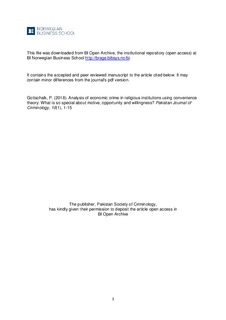Analysis of economic crime in religious institutions using convenience theory: What is so special about motive, opportunity and willingness
Journal article, Peer reviewed
Accepted version
Permanent lenke
http://hdl.handle.net/11250/2502752Utgivelsesdato
2018Metadata
Vis full innførselSamlinger
- Publikasjoner fra CRIStin - BI [1015]
- Scientific articles [2181]
Originalversjon
Pakistan Journal of Criminology. 2018, 10 (1), 1-15.Sammendrag
There is a research debate whether or not religious people demonstrate less delinquent behavior in terms of white-collar crime. This article focuses on those members of religious institutions who become offenders, and the article attempts to explain their behavior by the theory of convenience. Convenience theory suggests that the extent of white-collar crime is determined by financial motive, organizational opportunity, and personal willingness. As described in this article, religiosity may influence motive, opportunity, as well as willingness. The motive can be a greater good, the opportunity can be the lack of control because of trust, and the willingness can be the availability of forgiveness.
